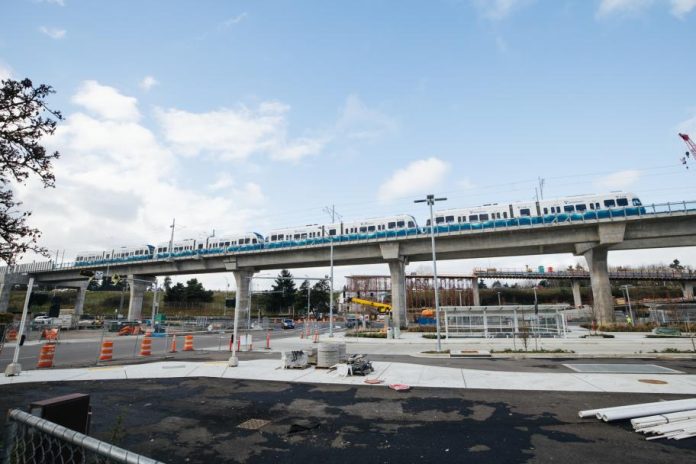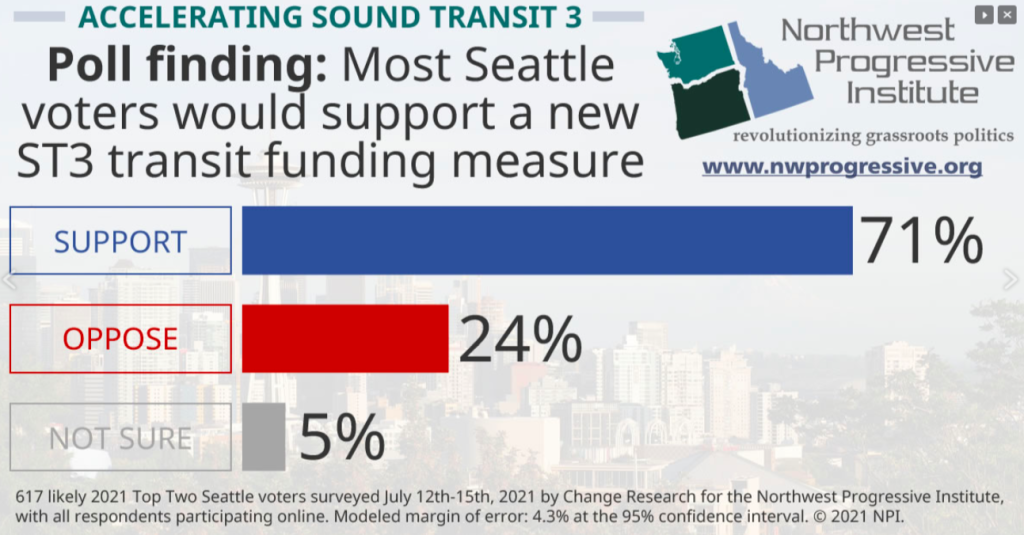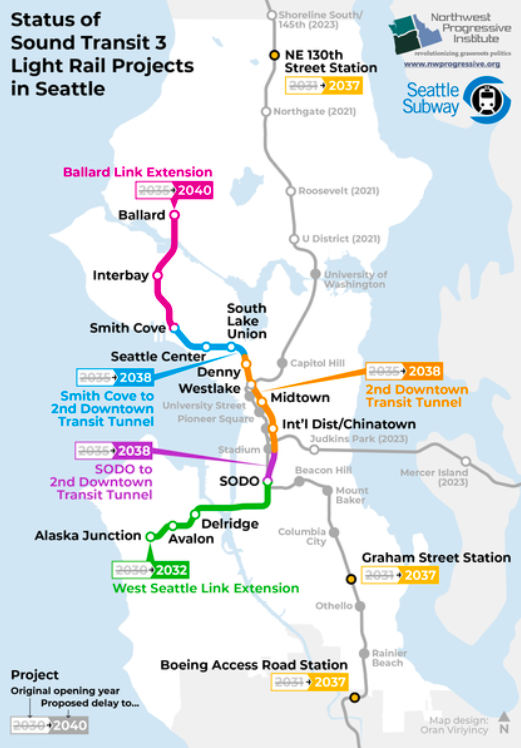
In a recent poll, 71% of Seattle voters said they would approve a new funding measure to avoid Sound Transit 3 delays.
Urbanist action alert: You can weigh in on the Sound Transit 3 (ST3) realignment plan and amendments ahead of the upcoming Board of Directors’ meeting by emailing emailtheboard@soundtransit.org. Comments will be accepted up until the meeting on Thursday, August 5th at 1:00pm. Verbal comments can also be provided at the virtual online meeting by signing up beforehand.
With the clock counting down to a planned final ST3 realignment Board of Directors’ vote this Thursday, the Northwest Progressive Institute has shared results from a recent poll gauging voters willingness to pay more to accelerate the completion of Link light rail expansion in the region. Their polling found that Seattleites remain steadfast in their support for expanding transit — despite sustained attacks on Sound Transit by right-wing saboteurs like Tim Eyman, whose Initiative 976 ($30 car tabs) nearly imploded the agency’s budget before being struck down by the courts.
Overall, 71% of Seattleites polled stated they were in favor of approving a new funding measure to ensure that ST3 projects can maintain their current timeline or be accelerated to open earlier, while another 5% expressed that they were unsure. Those numbers roughly equate to the 76% Seattle voters who opposed I-976 back in 2019, showing that enthusiasm for Link light rail expansion has not been diminished by the challenges and uncertainty wrought by a global pandemic.
QUESTION: The Sound Transit 3 light rail expansion projects inside Seattle shown on the map below may be delayed from opening to the public for several years past their original project completion dates primarily due to financial shortfalls. Would you support or oppose a new transit funding measure to speed up construction of current ST3 light rail expansion projects in Seattle?
Polling question shared with respondents by Change Research for the Northwest Progressive Institute
Young voters were most supportive, but no age group expressed strong opposition
Studying polling results closer reveals some generational trends. In a nutshell, the strongest support for a new transit funding measure was found among young voters aged 18-34, while the strongest opposition came from middle-aged voters aged 50-64, a cohort in which roughly a quarter of respondents expressed strong opposition. Here’s a complete breakdown of the results.
- Strongly support a new transit funding measure
- Young voters, 18-34: 68%
- Ages 35-49: 51%
- Ages 50-64: 35%
- Ages 65+: 29%
- Somewhat support a new transit funding measure
- Young voters, 18-34: 21%
- Ages 35-49: 23%
- Ages 50-64: 25%
- Ages 65+: 36%
- Somewhat oppose a new transit funding measure
- Young voters, 18-34: 3%
- Ages 35-49: 6%
- Ages 50-64: 10%
- Ages 65+: 10%
- Strongly oppose a new transit funding measure
- Young voters, 18-34: 8%
- Ages 35-49: 14%
- Ages 50-64: 25%
- Ages 65+: 16%
- Not sure
- Young voters, 18-34: 0%
- Ages 35-49: 6%
- Ages 50-64: 5%
- Ages 65+: 9%
The fact that opposition was relatively weak across all groups is another strong indicator of the broad popularity for raising the funding necessary to accelerate the ST3 program.
These findings support advocacy by the MASS Coalition, of which The Urbanist is a member, urging Sound Transit to avoid disruptive delays on promised Link light rail expansion projects.
Seattle voters overwhelmingly approved a funding measure for King County Metro in 2020, and it seems very likely that if given the authority they will do so again to keep Sound Transit on track. During Seattle Subway’s mayoral forum, all of the candidates expressed support for state-level legislative changes that would enable Seattle to have the power to fund light rail on its own, indicating that future mayoral leadership will be in agreement with Seattleites about raising more funds to bring light rail faster to a city that direly needs it. The wrong alignment plan could result in delays that neither residents — nor city leadership — want to endure.
Cities around the region are planning around the rapid transit ST3 will deliver and hoping to transform from carcentric one-class suburbs to walkable transit-oriented mixed-income cities where people can put down roots and age in place. Delaying transit will have a domino effect, delaying good land use decisions and affordable housing. Let’s build momentum instead of abandoning it.
Doug Trumm, Executive Director, The Urbanist
Will the Sound Transit Board of Director’s Heed the Call?
These polling results arrive at a very consequential moment because decisions made in the final alignment vote will impact the future of transportation and urban development in the Seattle region for years to come. The fact that Board Chair Kent Keel has expressed support for a hybrid realignment plan that allows for the ST3 program to move forward for now mostly on schedule — or close to it — is reason for optimism. Yet, with individual boardmembers’ proposed amendments still up for debate a lot of details remain to be determined. If the meeting proceeds as planned on Thursday, it is sure to be a nail-biter.
Sound Transit’s board is composed of members from across the region, so not all members may be swayed by a poll completed in Seattle alone. However, the strength of Seattle’s support, coupled by the fact that a majority of voters in the Sound Transit taxing district across all counties opposed the cuts it would have imposed by I-976, presents a strong case for boldly advancing forward with ST3 plans.
Natalie Bicknell Argerious (she/her) is a reporter and podcast host at The Urbanist. She previously served as managing editor. A passionate urban explorer since childhood, she loves learning how to make cities more inclusive, vibrant, and environmentally resilient. You can often find her wandering around Seattle's Central District and Capitol Hill with her dogs and cat. Email her at natalie [at] theurbanist [dot] org.




